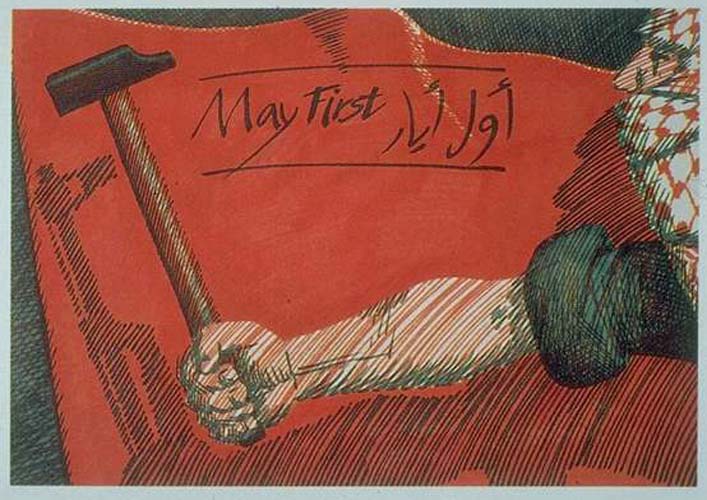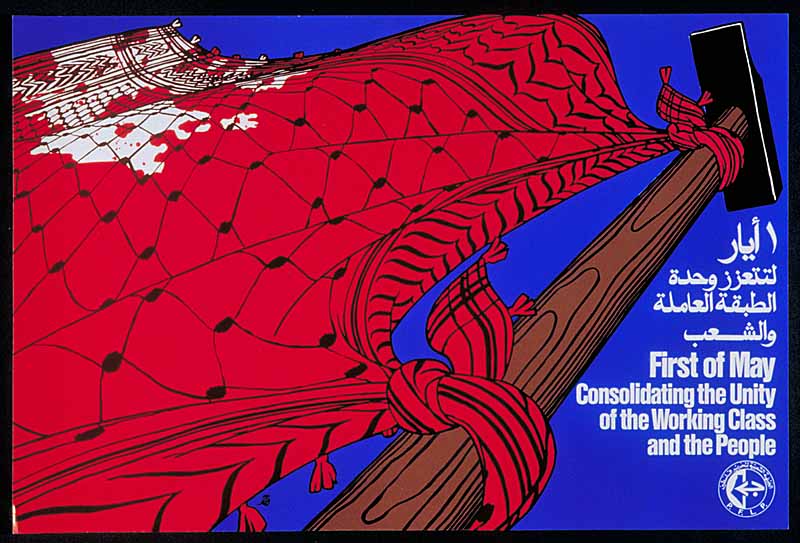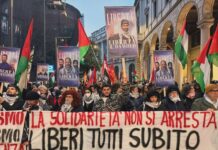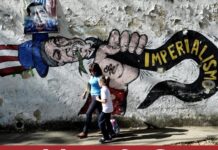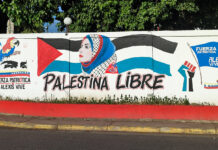On 1 May, we mark International Workers’ Day, a day of struggle around the world for all workers’ liberation from exploitation, racism, capitalism and oppression. It is also a day of struggle in Palestine specifically, marking the leading role of Palestinian workers in the struggle for liberation – including the struggle behind prison walls for freedom and liberation.
From the earliest revolts in Palestine for national liberation and self-determination, Palestinian workers have always been on the front lines, pushing the struggle forward as a leading revolutionary force. In the 1936 Palestinian revolution against British and Zionist colonialism, Palestinian workers launched a six-month general strike, then the world’s longest, demanding Palestinian self-determination; in the first Intifada, Palestinian labor unions and workers’ organizations led in organizing the struggle locally. It has always been Palestinian workers, peasants, and the Palestinian refugees in the camps – the displaced and expelled workers and peasants – providing the deepest and most consistent leadership in the liberation struggle.
Through nearly 100 years of struggle, Palestinian general strikes have been a constant of the struggle over decades. It was organizations of workers in Palestine – and then of UNRWA workers and others in the refugee camps of Lebanon and elsewhere – that paved the way for the organizing of the modern Palestinian revolution. Palestinian revolutionary leaders like Abu Maher al-Yamani built their organizing of Palestinian refugees for return and liberation on long histories of organizing workers in Palestine before the Nakba. As such, Palestinian workers and their leaders have consistently been targeted for repression and imprisonment.
Palestinian union organizers in Occupied Palestine ’48 were arrested in the 1950s as they struggled to remain organized under martial law; trade unionists were detained and deported throughout the 1970s and 1980s. At least seven Palestinian labor leaders in the West Bank were deported outside Palestine by the Israeli occupation between 1969 and 1979. At the same time, Palestinian prisoners inside Israeli jails struggled against forced labor in the prisons; Omar Shalabi, a Syrian prisoner, was killed under torture on 22 October 1973 as he protested against forced labor in Israeli prisons. Today, unionists and syndicate leaders like Omar Nazzal, member of the General Secretariat of the Palestinian Journalists’ Syndicate remain imprisoned by the Israeli occupation.
This comes in addition to the frequent arrests and imprisonments of Palestinian workers for “entering Israel without a permit,” generally seeking work to support their families. Because of the isolation and repression of the Palestinian economy, and its subjugation to the Israeli economy under the Paris Protocols accompanying the Oslo accords, Palestinians are forced to seek work – with or without permits – often as day laborers in construction. These arrested, fined and detained Palestinians are not classified as “security” prisoners and thus remain outside the statistics calculated of Palestinian political prisoners in Israeli jails – but there is no other way to view their situation but as deeply political, imprisoned for being Palestinians in Palestine, and specificially Palestinian workers on Palestinian land. Their imprisonment is part of the ongoing Nakba, the drive to exclude Palestinian workers from Palestine.
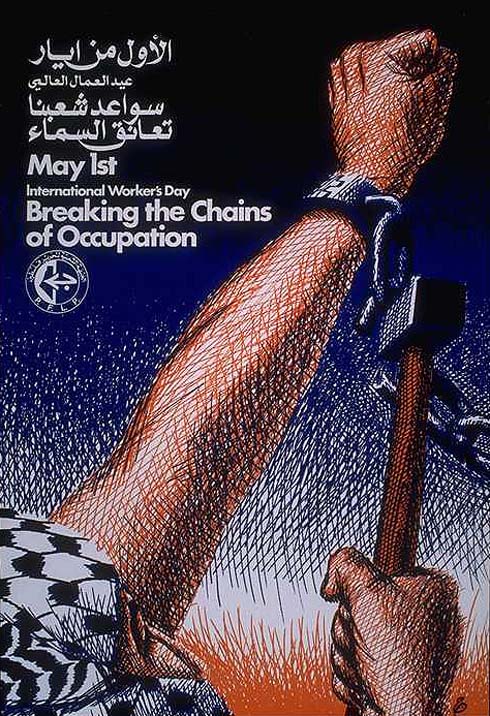 Palestinian refugees in Lebanon are denied access to over 70 professions; meanwhile Palestinian refugees forced to flee to Europe and elsewhere confront repressive policies that deny them the right to work. Palestinian migrants in the United States, Europe and elsewhere around the world face deportation, detention and exclusion alongside their fellow migrants and workers, people seeking safety and refuge from the very disasters, social, economic, environmental and military, visited upon their nations by the imperialist states that deny their rights- while continuing to struggle for liberation.
Palestinian refugees in Lebanon are denied access to over 70 professions; meanwhile Palestinian refugees forced to flee to Europe and elsewhere confront repressive policies that deny them the right to work. Palestinian migrants in the United States, Europe and elsewhere around the world face deportation, detention and exclusion alongside their fellow migrants and workers, people seeking safety and refuge from the very disasters, social, economic, environmental and military, visited upon their nations by the imperialist states that deny their rights- while continuing to struggle for liberation.
Of course, Palestinian workers face not only Israeli occupation and oppression, and the oppression of the same imperialist states that provide massive political, economic and military support to the Israeli state;
they also confront the role of Palestinian capitalists and the Palestinian Authority as a subcontractor to Israeli occupation. From the efforts of the Jordanian monarchy to support Palestinian capitalists and suppress union organizing in the 1970s and the 1980s to the role of Palestinian capitalists like Bashar al-Masri in promoting trade with Israel and breaking the boycott, to the PA’s attempts to suppress the mass movement of Palestinian teachers for their rights as workers and its promulgation of a draft Social Security Law that leaves Palestinian workers deeply insecure while meeting the demands of big Palestinian capitalists, it has been Palestinian workers pushing forward the movement to liberate Palestine, and those who exploit them engaging in ongoing negotiations and agreements that suppress the rights of Palestinians as workers and as oppressed people struggling for justice.
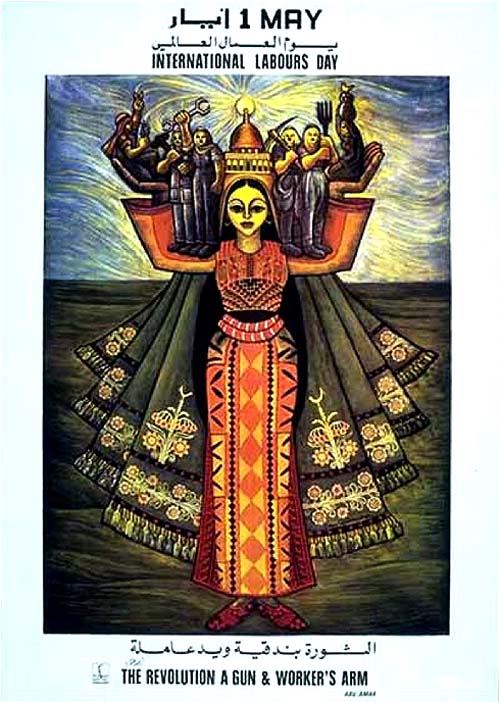 Palestinian workers also confront not only the Israeli state but the Israeli Histadrut – a trade union framework set up with the express purpose of excluding Palestinians and building the Zionist colonization of Palestinian land. As the US Prison, Labor and Academic Delegation to Palestine noted, “The exploitation of Palestinian labor is part and parcel of the ongoing colonization project. Palestinian trade unionists detailed this exploitation to our delegation historically and contemporarily. They explained that the Histadrut—the Israeli labor federation that enjoys a fraternal relationship with the AFL-CIO—has been an integral part of the Zionist movement and the colonization of Palestine even before the creation of the state of Israel. The Histadrut exploits Palestinian workers in Israel by deducting a portion of their salaries for benefits they never receive.”
Palestinian workers also confront not only the Israeli state but the Israeli Histadrut – a trade union framework set up with the express purpose of excluding Palestinians and building the Zionist colonization of Palestinian land. As the US Prison, Labor and Academic Delegation to Palestine noted, “The exploitation of Palestinian labor is part and parcel of the ongoing colonization project. Palestinian trade unionists detailed this exploitation to our delegation historically and contemporarily. They explained that the Histadrut—the Israeli labor federation that enjoys a fraternal relationship with the AFL-CIO—has been an integral part of the Zionist movement and the colonization of Palestine even before the creation of the state of Israel. The Histadrut exploits Palestinian workers in Israel by deducting a portion of their salaries for benefits they never receive.”
We salute the growing calls for boycott, divestment and sanctions from labor unions around the world, including the Canadian Union of Postal Workers, the Congress of South African Trade Unions, the National Union of Teachers, Public Services International, the Quebec Confédération des syndicats nationaux, the United Electrical Workers union, the Scottish Trade Union Congress and more labor organizations in Ireland, Norway, Sweden, Belgium, Basque Country, Spain, Galicia, Brazil and more. We salute the workers of the International Longshore and Warehouse Union Local 10 in Oakland, California, who have taken real, material action to implement BDS and stand with Palestinian workers by Blocking the Boat and preventing the unloading of a ZIM ship for days; we salute the Labor for Palestine campaigners and the UAW locals and student workers across the US struggling for Palestine. We recall the leadership of Black and Arab autoworkers in Detroit in 1973 striking against their union’s purchase of Israel Bonds.
We express our solidarity and common struggle with workers around the world, and the imprisoned leaders of workers’ movements struggling for liberation. From Colombia to India to Egypt to the Philippines, we stand with workers’ movements targeted for repression, and with the workers of the world who continue to struggle not only to stop neoliberal attacks like France’s new proposed labor law, but also to seek their – and all of our – full liberation from imperialism, capitalism and oppression.
We urge labor activists around the world to escalate solidarity and struggle to support Palestinian workers, on the front lines confronting the occupation; for unions to divest from Israel Bonds, boycott the Histadrut and stand with Palestinian workers as they struggle to achieve their liberation as laborers and as Palestinians, from oppression, exploitation, occupation, Zionism and settler colonialism.
Images: Classic posters of the Palestinian revolution
Discover more from Samidoun: Palestinian Prisoner Solidarity Network
Subscribe to get the latest posts sent to your email.

